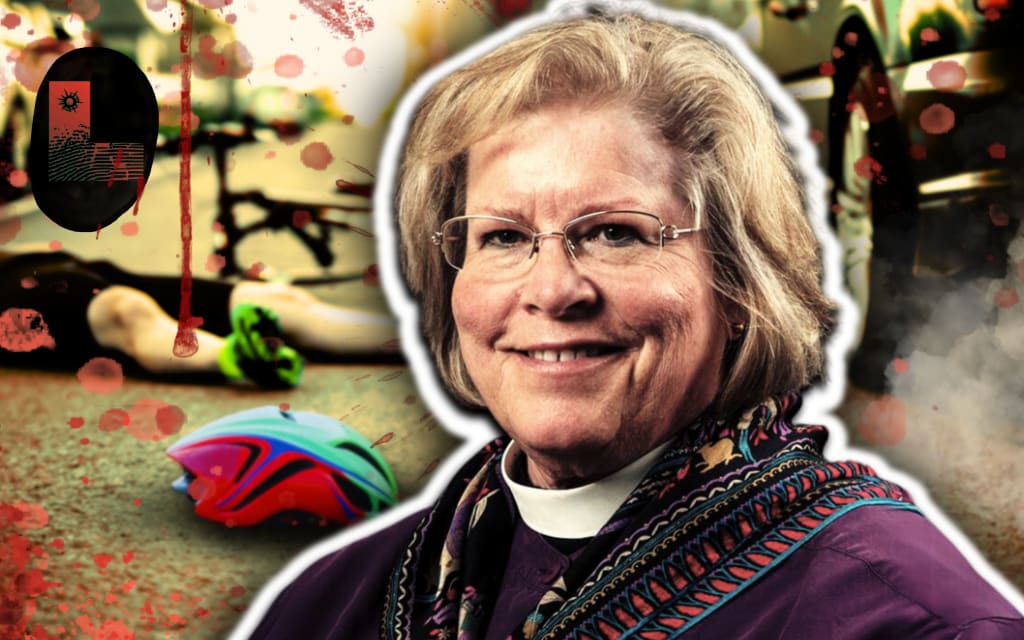Echoes of Privilege
Bishop Heather Cook's Fatal Hit-and-Run Case and Justice

In December 2014, a tragic event shocked the Episcopal Diocese of Maryland and the larger community when cyclist Tom Palermo lost his life in a hit-and-run accident. The driver who initially fled the scene was Heather Cook, an ordained Bishop in the church. This case raised difficult questions about justice, forgiveness, accountability, and the examination of conscience.
Heather E. Cook, born in 1957 in Syracuse, NY, became an ordained Episcopal minister in Maryland in 1987. She served in various clergy roles across multiple states over the next few decades. However, in 2010, while working as a Canon in Caroline County, MD, she was arrested for drunk driving after police discovered liquor, marijuana, and paraphernalia in her vehicle. With blood alcohol content triple the legal limit, Cook admitted to heavy drinking and marijuana use. She received probation and was ordered to pay a $300 fine.
While problematic, the church opted to give Cook a second chance rather than terminating her employment. A demonstration of forgiveness by the church, also meant Cook avoided potential professional consequences that may have mitigated the risk for future accidents.
In September 2014, Heather Cook was elected Bishop Suffragan of the Episcopal Diocese of Maryland, becoming the first female bishop in the diocese and earning a position of increased leadership and authority.
On December 27, 2014, however, while driving her green Subaru Forester station wagon, Cook, allegedly intoxicated again struck local cyclist Tom Palermo, 41, a recently married father of two young children. Based on eyewitness accounts, Cook initially fled the scene without stopping to render aid, leaving the man gravely injured in the street. Approximately 20 minutes later, she returned to take responsibility for her involvement. However, Mr. Palermo died shortly after at the hospital due to traumatic injuries sustained in the collision.
State's Attorney Marilyn J. Mosby described the incident as "extremely tragic" after assuring the Palermo family that justice would be pursued stating “no one is above the law.” Bishop Heather Cook, aged 58, who had been elected to the second-highest position in the diocese the previous year despite a 2010 guilty plea for driving under the influence, was found to have a blood-alcohol level of 0.22 when she returned to the crash site, well above the legal limit of 0.08 in Maryland.

Cook's decision to leave the accident site before reporting her involvement sparked intense public criticism. Many questioned how the Bishop could exhibit such negligence for human life, especially given her role as a faith leader called to compassion and morality. Others pointed to the institutional failure of the church in appointing Cook to a position of influence despite knowing her previous DUI history.
After widespread outcry, Cook was eventually arrested and charged. The judge sentenced her to seven years in prison following guilty pleas to charges of vehicular manslaughter, criminal negligence, leaving an accident scene with injuries and death, texting while driving, and DUI, with bail set at $2.5 million.
According to members of the Maryland Parole Commission board, throughout incarceration, Cook expressed little remorse or apology to the victim's grief-stricken family. Thus, the denial of her request for early parole in May 2017. However, after serving just over three years, Cook was released in 2019 under probationary monitoring until 2024.
This complex case invoked many perspectives surrounding justice, the concepts of punishment and rehabilitation, and the examination of conscience. If faith leaders receive preferential treatment when breaking laws, does it not risk undermining the very principles of fairness and equality that our legal system is built upon? Had Cook been an average citizen rather than a Bishop, would the initial charges and sentencing have been harsher?
A public defender, Todd H. Oppenheim said, "If one of my clients, who are mostly African-American men, hit Palermo, charges would have been immediately filed against them,” expressing concerns about potential disparities in the legal treatment of different individuals.
From an institutional standpoint, challenging questions arose regarding the appropriateness of ordaining Cook as a Bishop given knowledge of her prior DUI. Where should the line be drawn between forgiveness and professional consequence? Is the vetting process comprehensive enough to confirm clergy meets the highest moral standards before granting such authority?
Additional concerns centred around proportional accountability - Some called for empathy and forgiveness, believing Cook was worthy of a second chance if she truly accepted responsibility. Others felt Cook deserved harsher punishment for her role in Mr. Palermo's death.
Investigators report that on December 27, Bishop Cook, while driving behind Mr. Palermo, was distracted by texting, veered into the right lane, and struck him. Tragically leading to the death of Mr. Palermo, a father of two young children, Sadie, 6, and Sam, 4.

At her core, Heather Cook is human - imperfect, flawed, and capable of grave mistakes. Yet, her actions and the response of the church force us to reflect on the responsibility of those in positions of moral authority. The outcome of cases like Bishop Heather Cook's has far-reaching implications for the public's trust in religious institutions and their ability to uphold the values they preach.
While the Heather Cook case is undeniably tragic, perhaps there are lessons people of all backgrounds can draw from reflecting deeply on this case. The tragedy resulted in unimaginable grief for Tom Palermo's loved ones, a sober reminder of the sanctity of human life. It also prompted important dialogue on reconciliation, the need for moral courage in positions of influence, and improving systems of accountability.
The tragic case of Bishop Heather Cook's fatal hit-and-run incident presents profound questions about justice, accountability, and the role of privilege in our society. Some accounts appear to highlight the unfair and disproportionate treatment of religious leaders in the criminal justice system, underscoring the need for impartiality and equal accountability. However, cases like this rarely provide easy answers. Yet when engaged with openness, truth, and a commitment to upholding the core principles of justice, they serve as catalysts for much-needed dialogue and change.
About the Creator
Victor Pope
Hello, I'm Victor from Lawless Media, an uncensored True Crime blog that dives deep into the realities of crime, punishment, and justice






Comments
There are no comments for this story
Be the first to respond and start the conversation.